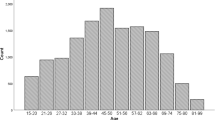Abstract
This paper fills a gap in the literature by looking at influences on the well-being of the citizens of Russia and Ukraine in the context of the triple shock – economic, political and social – that they experienced after 1991. The paper argues that lived experience – how people evaluate their living conditions – is as significant an influence on the welfare of citizens as are the actual conditions in which they live. The majority of the populations perceive the post-1991 economic and political changes negatively, and levels of general satisfaction and happiness are comparatively low. The findings suggest that objective economic factors, geographical/social location, health status and social context influence well-being, but also personal control and satisfaction with material circumstances, with health having a greater influence on happiness, while material circumstances and the evaluation of them have a greater influence on general satisfaction. The paper concludes by arguing for a model of reciprocal causation in which material factors provide the partially determining context for actions and are themselves influenced by happiness and satisfaction.
Similar content being viewed by others
References
Abbott, P. and C. Wallace: 2004, Explaining economic and social transition in post-Soviet Russia, Ukraine and Russia: the Social Quality approach. Paper presented at the annual conference of the Sociological Association, York, April
Alber, J. and U. Kohler: 2004, Health and Care in an Enlarged Europe. Dublin, European Foundation for the Improvement of Living and Working Conditions
Alexander, J.: 1997, ‘Surveying attitudes in Russia: A representation of formlessness’, Communist and Post-Communist Studies pp. 107–127
E. Allart (1993) Having, loving, being: An alternative to the Swedish model of Welfare Research M. Nussbaum A.K. Sen (Eds) The Quality of Life Clarendon Press Oxford
F.M. Andreys S.B. Withey (1976) Social Indicators of Well-Being Plenum Press New York
Beck, W., M. Keizer, L.J.G. van der Maeson and D. Phillips: 2001, General Paper on behalf of the first plenary of the Network Indicators of Social Quality (European Foundation on Social Quality, Amsterdam)
J.C. Brunstein (1993) ArticleTitle‘Personal goals and subjective well-being: a longitudinal study’ Journal of Personality and Social Psychology 65 1061–1070 Occurrence Handle10.1037/0022-3514.65.5.1061
M. Burawoy (1997) ArticleTitle‘The Soviet descent into capitalism’ American Journal of Sociology 2 1430–1444 Occurrence Handle10.1086/231090
Burawoy, M., P. Krotov and T. Lytkina: (ND) Involution and Destitution: Russia’s Gendered Transition to Capitalism. University of California Press, Berkeley, CA
A. Campbell D.E. Converse W.L. Rogers (1976) The Quality of American Life Russell Sage Foundation New York
Cockerham, W.C.: 1999, Health and Social Change in Russia and Eastern Europe (Routledge, London)
J. Cornwell (1986) Hard-Earned Lives: Accounts of Health and Illness in East End London Tavistock London
S.K. Dasgupta (2002) Sense of well-being and perceived quality of life in Calcutta E.D. Diener D.R. Rahtz (Eds) Advances in Quality of Life Theory and Research Kluwer Dordrecht
Delhey, J.: 2004, Life Satisfaction in an Enlarged Europe. European Foundation for the Improvement of Living and Working Conditions, Berlin
E. Diener C. Diener (1996) ArticleTitle‘Most people are happy’ Psychological Science 7 181–185 Occurrence Handle10.1111/j.1467-9280.1996.tb00354.x
E. Diener F. Fujita (1995) ArticleTitle‘Resources, personal strivings and subjective well being: A nomothetic and ideographic approach’ Journal of Personality and Social Psychology 68 126–135
E. Diener J. Horwitz R.A. Emmons (1985) ArticleTitle‘Happiness of the very wealthy’ Social Indicators Research 16 263–274 Occurrence Handle10.1007/BF00415126
E. Diener E. Suh (1997) ArticleTitle‘Measuring quality of life: Economic, social and subjective indicators’ Social Indicators Research 40 189–216 Occurrence Handle10.1023/A:1006859511756
E. Diener E. Suh R.E. Lucas H.L. Smith (1999) ArticleTitle‘Subjective well-being: Three decades of progress’ Psychological Bulletin 125 276–302 Occurrence Handle10.1037/0033-2909.125.2.276
N. Donovan D. Halpern (2002) Life Satisfaction: The State of Knowledge and Implications for Government Strategy Unit London
E. Durkheim (1952) Suicide: A Study in Sociology Routledge London
T. Fehey E. Smyth (2004) ArticleTitle‘Do subjective indicators measure welfare?’ European Societies 6 5–27 Occurrence Handle10.1080/1461669032000176297
Freedman, J. and P. Shaver: 1975, ‘What makes you happy questionnaire’, Psychology Today, 70
B.S. Frey A. Stutzer (2002) ArticleTitle‘What can economists learn from happiness research?’ Journal of Economic Literature 40 402–435 Occurrence Handle10.1257/002205102320161320
W. Glatzer (1991) Quality of life in advanced industrial countries: the case of West Germany F. Strack M. Argyle N. Schwarz (Eds) Subjective Well-Being Pergamon Oxford
K.L. Grazin L.M. Haggerd (2000) An integrative explanation for quality of life: development and test of a structural model E.D. Diener D.R. Rahtz (Eds) Advances in Quality of Life Theory and Research Kluwer Dordrecht
A. Kozma M.J. Stones (1983) ArticleTitle‘Predictors of happiness’ Journal of Gerontology 38 626–628
E.S. Kozma S. Stone M.J. Stones (2002) Stability in components and predictors of subjective well-being: Implications for SWB structure E.D. Diener D.R. Rahtz (Eds) Advances in Quality of Life Theory and Research Kluwer Dordrecht
K.J. Larson E. Diener R.A. Emmons (1985) ArticleTitle‘An evaluation of subjective well-being measures’ Social Indicators Research 17 1–18 Occurrence Handle10.1007/BF00354108
M. Lewinsohn J.E. Redner J.R. Seeley (1991) The relationship between life satisfaction and psychosocial variables: New perspectives F. Strack M. Argyle N. Schwarz (Eds) Subjective Well-Being Pergamon Oxford
C. McFarland R.J. Miller (1994) ArticleTitle‘The framing of relative performance feedback: Seeing the glass half empty or half full’ Journal of Personality and Social Psychology 66 1061–1073 Occurrence Handle10.1037/0022-3514.66.6.1061
N. Orlova P. Ronnes (1999) ArticleTitle‘The crippling cost of an incomplete transformation: The case of Ukraine’ Post-Communist Economies 11 373–397 Occurrence Handle10.1080/14631379995931
A.J. Oswald (1997) ArticleTitle‘Happiness and economic performance’ Economic Journal 107 1815–1831 Occurrence Handle10.1111/1468-0297.00260
Pomerleau, J., M. McKee, R. Rose, D. Balabanova and A. Gilmore: 2002 ‘Comparative Health Report: Health Conditions and Health Behaviours’, in C. Haerpfer (ed.), Living Conditions, Lifestyles and Health: Periodic Progress Report No 2, Nov 2001–Oct 2002. Institute for Advanced Studies, Vienna
J. Popay C. Thomas G. Williams A. Gattrell L. Bostock (2003) ArticleTitle‘A proper place to live: Health inequalities, agency and the normative dimensions of space’ Social Science and Medicine 57 55–69 Occurrence Handle10.1016/S0277-9536(02)00299-X
Redmond, G.: 2002, Social Monitor: the MONEE Project, CEE/CIS/Baltics. UNICEF Innocenti Research Centre, Florence
Rose, R.: 1995, ‘Russia as an Hour-Glass society’, East European Constitutional Review 4, pp. 34–42
Rose, R.: 2003, Health, Money and Well-Being: Subjective Responses to Post-soviet Transformations. Paper presented at the European Science Foundation, Paris, September
W. Saris (2001) ArticleTitle‘What influences subjective well-being in Russia?’ Journal of Happiness Studies 2 137–146 Occurrence Handle10.1023/A:1011556429502
Schutz, W.: 2000, Explaining Quality of Life: The Controversy between Objective and Subjective Variable. EU Reporting, Working Paper, Vienna
P. Schyns (2001) ArticleTitle‘Income and satisfaction in Russia’ Journal of Happiness Studies 2 173–204 Occurrence Handle10.1023/A:1011564631319
A.K. Sen (1993) Capability and Well-Being M. Nussbaum A.K. Sen (Eds) The Quality of Life Clarendon Press Oxford
J. Siegrist (2000) ArticleTitle‘Place, social exchange and health: Proposed sociological framework’ Social Science and Medicine 51 1283–1293 Occurrence Handle10.1016/S0277-9536(00)00092-7
P. Sztompka (2002) ArticleTitle‘Cultural Trauma: The other face of social change’ European Journal of Social Theory 3 441–465
van der Maesen, L. and M. Keizer: 2002, From Theory to Practice. European Foundation on Social Quality, Working Paper of the European Network on Indicators for Social Quality, Amsterdam
R. Veenhoven (1984) Conditions of Happiness Reidel Dordrecht
R. Veenhoven (1991) Questions on happiness: Classical topics, modern answers, blind spots F. Strack M. Argyle N. Schwarz (Eds) Subjective Well-Being Pergamon Oxford
R. Veenhoven (2001) ArticleTitle‘Are the Russians as unhappy as they say they are?’ Journal of Happiness Studies 1 33–46
R. Veenhoven (2002) ArticleTitle‘Why social policy needs subjective indicators’ Social Indicators Research 58 33–46 Occurrence Handle10.1023/A:1015723614574
World Bank, 1991, Human Development Report 199. World Bank, Washington, DC
World Bank, 2003, Human Development Report 200. World Bank Washington, DC
O.N. Yanitsky (2000) ArticleTitle‘Sustainability and risk: The case of Russia’ Innovations 13 265–277
Author information
Authors and Affiliations
Corresponding author
Rights and permissions
About this article
Cite this article
Abbott, P., Sapsford, R. Life-Satisfaction in Post-Soviet Russia and Ukraine. J Happiness Stud 7, 251–287 (2006). https://doi.org/10.1007/s10902-005-5563-2
Issue Date:
DOI: https://doi.org/10.1007/s10902-005-5563-2




